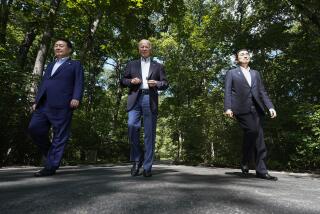Clinton’s Visit Is Music to Ears of Cheering GIs
- Share via
HONOLULU — President Clinton arrived in Hawaii on Sunday after winding up a six-day Asian visit by playing his saxophone at a U.S. base in South Korea before 2,000 soldiers, who greeted him with loud whoops and cheers as he praised their service and promised to hold the line on defense budget cuts.
“You are a very critical part of the finest armed forces the world has ever seen,” Clinton told the camouflage-clad troops gathered in a massive airplane hangar at Camp Casey, a U.S. base just south of the Korean demilitarized zone where former President George Bush had spoken in 1989.
“It is a great privilege for me to be here on the frontier of freedom,” Clinton said.
The speech, as Clinton aides had hoped, provided a perfect set of television pictures for a White House bent on displaying the image of “President with troops.”
Clinton stood onstage in the hangar surrounded by soldiers. Two huge banners proclaiming, “The Warrior Division Welcomes the Commander in Chief,” framed the picture as still more uniformed troops stood on a truck in the doorway of the hangar, silhouetted against the hills.
Inside the hangar, soldiers of the 8th Army’s 2nd Infantry Division shouted war whoops and waved battalion pennants as Clinton spoke.
The shouting redoubled after the speech as Clinton shook hands with troops, then went back up on stage, took a saxophone from the military band and joined the musicians in a rendition of the jazz tune “B-Flat Blues.”
Clinton and his top aides then boarded helicopters for a short flight back to Seoul and then took Air Force One to Hawaii, where he plans to spend a two-day vacation before returning to Washington.
Arriving at Pearl Harbor, the President and First Lady Hillary Rodham Clinton greeted their daughter, Chelsea, who placed three leis around her father’s neck. Others piled more leis on Clinton as he worked his way along a receiving line, burying him up to his chin in orange, white and purple orchids.
Clinton--accompanied by Mrs. Clinton, Defense Secretary Les Aspin and Adm. Charles R. Larson, the commander of the Pacific Fleet--visited the memorial of the battleship Arizona, sunk in the Japanese attack on Pearl Harbor on Dec. 7, 1941. He and the First Lady performed the traditional ceremony of tossing a lei of purple orchids onto the water, standing a moment by the deck rail with heads bowed.
Clinton remarked on the huge changes that have overtaken the Pacific region and the world since the end of World War II. “Our closest friends now are those with whom we fought a half a century ago,” he said.
“And yet it is still clear now as it was then that the United States cannot disengage from the world,” Clinton said. “To be economically and physically secure, we must continue to be strong.”
His Asian trip began with talks with leaders of six other leading industrial nations at the Group of Seven economic summit in Tokyo. Clinton then made a two-day visit to South Korea, where he addressed the National Assembly and visited U.S. troops at the border between the south and the Communist north.
The President spent much of the last two days talking about the security commitments the United States undertook after the war--guaranteeing the security of Japan and South Korea. In his Camp Casey speech, he reiterated U.S. intentions to maintain those guarantees and sought to reassure military personnel that he would resist pressures for deep new cuts in defense spending.
There is, he said, “a line below which we cannot go. Our armed forces must still be able to fight and win on a moment’s notice.”
“Too many times in the past, in the absence of an overpowering threat, our country has forgotten just how badly we need people like you,” Clinton said. “We must not ever make that mistake again.”
As with his trip to the DMZ earlier, the visit to Camp Casey also had a second purpose--strengthening the President’s weak relations with the soldiers under his command. Judging by the reaction to his visit, that effort may be paying off.
But precisely gauging the reaction to Clinton was difficult. Military public affairs officers prevented reporters from interviewing any but a small group of handpicked soldiers, all of whom offered effusive praise for the President.
Military officials insisted that they were restricting interviews to avoid disrupting the ceremony.
More to Read
Sign up for Essential California
The most important California stories and recommendations in your inbox every morning.
You may occasionally receive promotional content from the Los Angeles Times.











